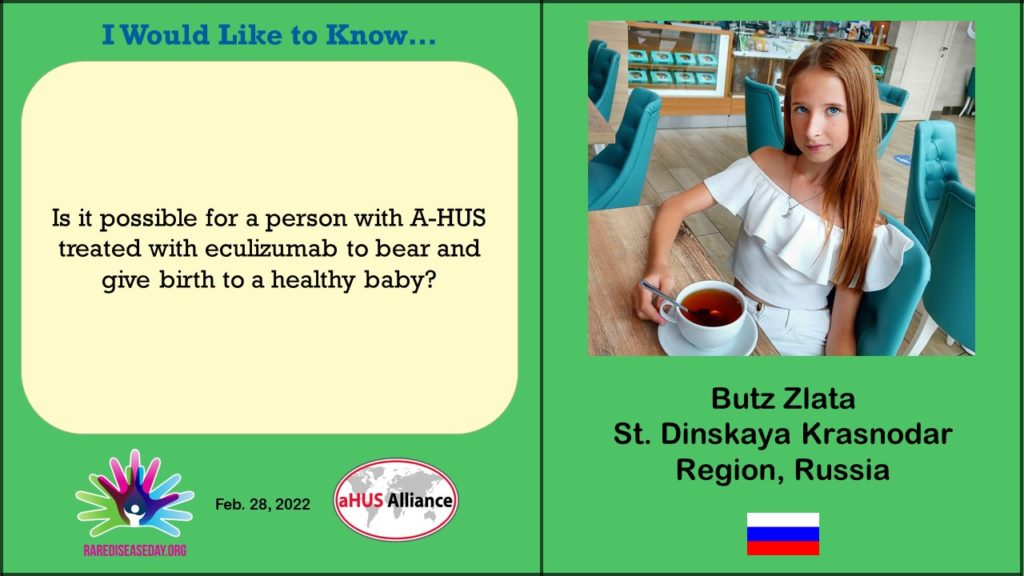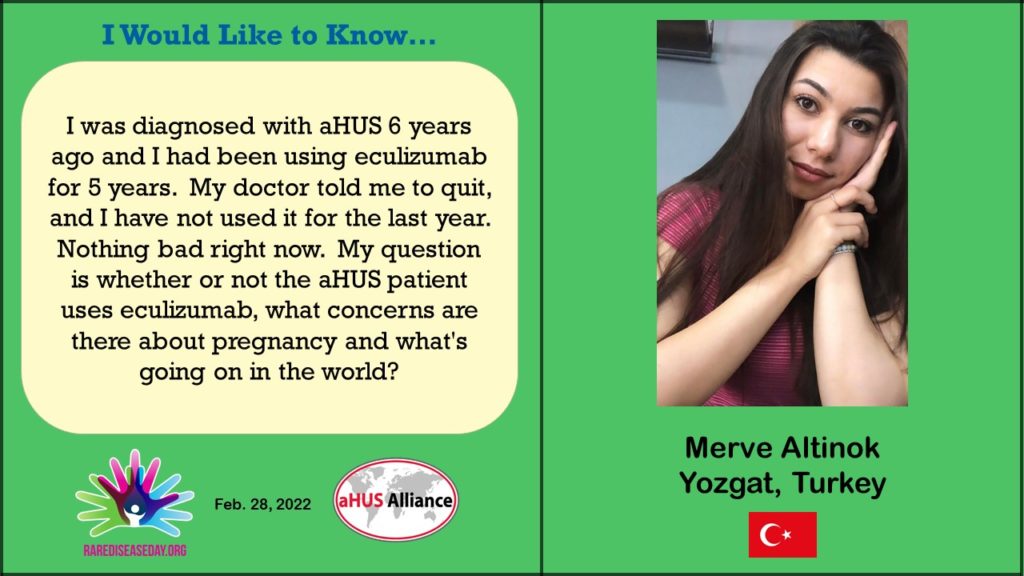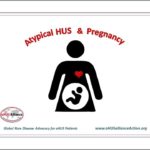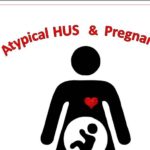Pregnancy is an important topic and has featured a lot on this website. Quite a few questions about it in the RDD2022 video though. A lot ore is known about it these days. Learned from years of experience rather than drug trials.
Being pregnant was an exclusion criteria for participating in the eculizumab trials, so those trials could not help the cause of understanding what happens to the aHUS mother and child.
Pregnant women were also excluded from Ravulizumab trials for PNH and aHUS ,so there is no data about birth defects, miscarriage or damage to the fetus or mothers. Just an offsetting balance of advice for the drug that “untreated aHUS also has its risks”.
aHUS in pregnancy increases risks of adverse maternal outcomes, including pre-eclampsia and pre-term delivery, and adverse fetal/neonatal outcomes, including intrauterine growth restriction (IUGR), fetal death and low birth weight. In animal testing ravulizumab ,at some dosing levels , was found to increase abnormalities and dead and “moribund ” offspring. Eculizumab may be the treatment of choice in pregnancy for a while yet.
Although there is no evidence of ravulizumab in human milk , breast fed children may be at risk of possible serious adverse reaction. It has been advised that breast feeding should be stopped during ravulizumab treatment and for at least 8 months after a final ravulizumab dose.
However in the ravulizumab trials eight women were included when their aHUS onset after giving birth and they were successfully treated. It is very likely that by now they have even successfully withdrawn from treatment.
So for those onsetting post- partum and lactating , and also those whether “in treatment” or not, when making family plans there are considerations to be made.
If something adverse happens there is report system for these events. The most reported serious adverse event was that pregnancies were terminated by parents’ decision. More aHUS parents chose to do that than PNH parents, when faced with using the same drug eculizumab. aHUS can be inherited , PNH is not.
“aHUS pregnancies” can be healthy for mother and child with no incidence, Butz. Although it is more likely to happen after giving birth, it can happen during pregnancy, particularly in the second pregnancy.
Generally Complement becomes more active during pregnancy because of the fetus, but Complement is normally well controlled. Initially it was not known what would happen to mother and baby if eculizumab was used, but in turned out to be fine and many aHUS mothers have had safe and successful outcomes.

For someone who has experienced aHUS in the past, but who was in remission without treatment, the pregnancy trigger could cause a relapse, Merve. Treatment with eculizumab would safely resolve the condition but it should be reintroduced rapidly as with any withdrawal from treatment re-onset.

Women with a personal medical history of aHUS should be closely monitored throughout the pregnancy having been counselled about the risks of relapse beforehand. Though no specific protocol has been has been agreed, one was developed by the Deleep Kumar Group of the The Jacobi Medical Centre , New York. In an article about it the Group say in their abstract :
Because of her significant (aHUS) obstetric history, a multidisciplinary approach was adopted to monitor her second pregnancy antepartum and post partum. As the patient developed recurrence of P-aHUS 4 days after her delivery, she was immediately administered eculizumab within few hours of disease manifestation.
It took a week for her aHUS to be controlled and six weeks more on kidney dialysis before her kidneys recovered . Hence the need for rapid eculizumab treatment administration.
Care needs to be taken too during pregnancy, or after child birth, for women with a known genetic predisposition to aHUS, or if not tested, who are part of a family which has a known history of aHUS. They are at risk of an onset for which rapid treatment could resolve.

But to answer Nadja’s question about her daughter’s ability to have children Professor Fadi Fakhouri has counselled that “Pregnancy is no longer contraindicated in women with a history of aHUS“
The rest of Fadi’s aHUS pregnancy counselling advice follows:
As previously mentioned although there are no specific statistics aHUS mother have reported a successful pregnancy whilst on eculizumb treatment.The risk of relapse of aHUS during pregnancy or postpartum appears lower (∼25%) than formerly appreciated. An efficient treatment (anti-C5 treatment such as eculizumab) is available, Savanna.

2. The risk of relapse of aHUS triggered by pregnancy is difficult to predict. A prior uneventful pregnancy does not guarantee subsequent pregnancies will be free of relapse. Women who do not carry a complement gene variant are not protected from pregnancy aHUS.
3. An interval of ∼12 months of aHUS remission and stabilized renal function is appropriate before pregnancy initiation.
4. In women with prior aHUS, relapse of aHUS occurs more frequently DURING pregnancy than after delivery. In the pre-anti-C5 treatment era, this was associated with a high risk of fetal death or preterm birth.
5. CKD may be a limitation to pregnancy. Residual severe CKD or hypertension after aHUS may worsen during pregnancy, with increased risk of preeclampsia or HELLP syndrome, ESRD, and fetal death.
6. In case of aHUS relapse, prompt anti-C5 treatment initiation optimizes chances of patient’s full recovery and child’s full-term live birth.
7. Prophylactic anti-C5 treatment is currently not recommended. Anti-C5 treatment is usually not discontinued in women already treated prior to pregnancy (particularly renal transplant patients).
8. Pregnancy in a woman with a history of aHUS remains a high-risk pregnancy. Close multidisciplinary (obstetricians, nephrologists, neonatologists, and complement biologists) supervision from the first weeks of pregnancy and up to 3 months postdelivery in high-risk pregnancy maternity clinic is mandatory.
Some previous articles about Pregancy and aHUS follow:

Pregnancy and aHUS
The topic of pregnancy and aHUS is included in the Global aHUS Patients’ Research Agenda. It has featured in articles on this website. It has been a subject of interest…CONTINUE READINGPregnancy and aHUS

aHUS PREGNANCY COUNSELLING
Article No. 454 aHUS triggered by pregnancy is relatively common and accounts for 16% of female ( 18 to 45 years) aHUS incidents. 75% of the incidents occur post partum.…CONTINUE READINGaHUS PREGNANCY COUNSELLING

aHUS in pregnancy and after
Article No 410 13 January 2021 The link between pregnancy and aHUS has been known for several decades. A chapter was devoted to it in Prof. Bernard Kaplan’s book about…CONTINUE READING
aHUS in pregnancy and after

The right choice -Pregnancy and aHUS
It is reckoned that 1 in 25000 pregnancies are complicated by thrombotic microangiopathy (TMA). That is 40 in a million pregnancies. There are several causes of those TMAs. Pre- eclampsia…CONTINUE READINGThe right choice -Pregnancy and aHUS

“Good News” from talking about aHUS and Pregnancy
Earlier this year ,when the alliance was responding to the Rare Disease Day video questions , aHUS Patient Megan contacted the alliance having read the blog about pregnancy and aHUS…CONTINUE READING“Good News” from talking about aHUS and Pregnancy

aHUS Pregnancy – Answers prompt more questions!
Not surprisingly, as it is one of the hottest topics* in the aHUS community, there was a high number of questions about pregnancy in the Rare Disease Day video. About…CONTINUE READINGaHUS Pregnancy – Answers prompt more questions!

aHUS & Pregnancy: Questions, Concerns, and Research
UPDATED April 2019: New Research Added Click HERE to view the 24 August 2017 video regarding aHUS & pregnancy (Dr Craig Gordon, with preface by M Berry…CONTINUE READING
Article No. 504

